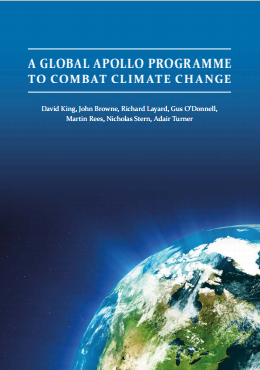The Pope, Apollo and G7 make a compelling energy and climate treble
Written by Mark Sait
Posted on June 16, 2015
The Pope’s strident intervention this week completes a compelling treble in the climate change debate.

Pope Francis planned to publish a papal letter on Thursday calling for transformative, radical action to prevent catastrophic climate change. It follows the G7 summit and the launch of the Global Apollo Programme, which both addressed the growing environmental crisis.
However, the document was leaked this morning, much to the dismay of the Vatican.
News of the Pope’s intervention had already been published by the Guardian ahead of the papal letter’s publication and immediately prompted a strong backlash from climate change deniers, aware no doubt of the power of the message to 1.2 billion Catholics all over the world.
While the focus of the letter is on the larger-scale structural shifts needed, it also underlines the importance of individual responsibility and how governments, business and consumers can work together to reduce the burden on the environment, not least through conscious moves to reduce consumption of energy and water.
The Pope calls people to change energy consumption patterns and lifestyles or face “unprecedented destruction of the ecosystem” before the end of this century. The pontiff has also argued for a global political authority to find ways to reduce pollution and aid development of poor countries and regions.
Energy and water savings
While the bleak messages about the state of the planet can be overwhelming, there should be positive dialogue between states, companies, organisations and individuals that affirms how easy it can be to cut use of energy and water by focusing on lighting, heating, pumping and water flow regulation.
The Pope’s very public intervention is not the first time he has raised questions about the exploitation of resources and the damage to the environment but it is the strongest and comes amid plans for his visit to the United States in three months’ time. There, he will address Congress and the UN general assembly as well as meet with President Obama.
Whatever the strength of reaction, the papal letter should energise the planning for the climate summit in Paris in November, seen by many as the last effective change to minimise severe damage caused by global warming.
G7 act together
This was coincidentally the key topic at the G7 meeting in Germany at the beginning of this month where leaders of the world’s top industrial nations agreed to phase out fossil fuels by the end of this century.
A 17-page communique, headed “Think Ahead, Act Together” was published after the meeting that confirmed the G7 would also work to cut CO2 emissions substantially by 2050 in line with the UN climate change panel’s recommendations of 40%-70% from the 2010 baseline.
The G7 leaders also discussed the Global Apollo Programme, promoted by top UK scientists, economists and business people which has set an ambitious goal of reducing the cost of clean electricity to below that of coal-fired power stations within 10 years. Longer term targets include making electricity 100% green by 2050.

Green R&D spending
Leading the programme’s promotion is Sir David King, the country’s top climate change diplomat who has been gathering support for the absolute necessity of a successful Paris summit by visiting 60 countries in the past year and a half. Other leading advocate include Lord Nicholas Stern, Lord Adair Turner and ex-BP chief Lord John Browne.
The group wants to see spending on R&D into renewable energy increased to £15 billion annually, doubling the current 2% of global R&D budgets spent on green technology research. The figure echoes that of space research efforts like the legendary Apollo programme – hence the name.
A pressing research issue is the need for adequate and affordable energy storage as the 2050 green electricity target requires this to balance out peaks and troughs in solar, wind and wave power production.
For us, the best thing about the compelling energy treble from the Pope, the G7 and the Global Apollo Programme is there is a chance for change – it’s up to us all to take part.